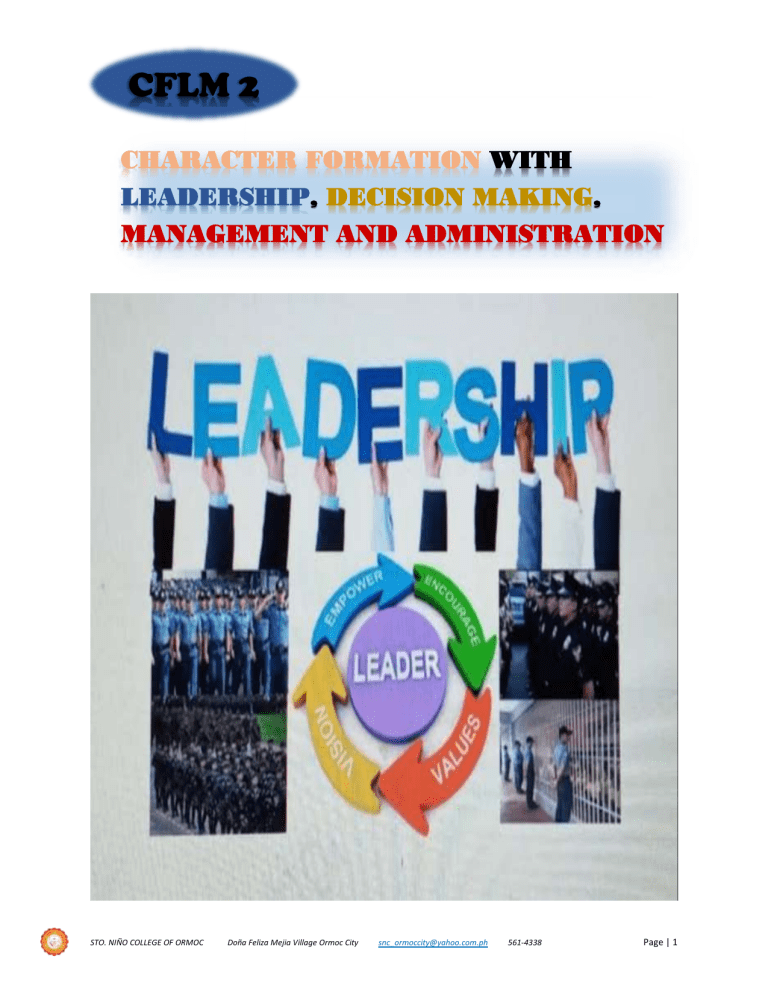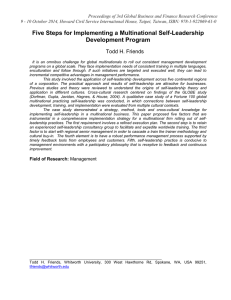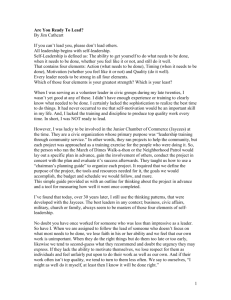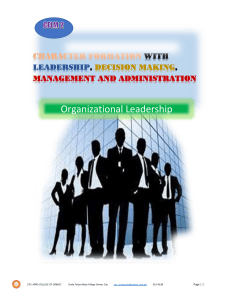
CFLM 2 CHARACTER FORMATION WITH LEADERSHIP, DECISION MAKING, MANAGEMENT AND ADMINISTRATION STO. NIÑO COLLEGE OF ORMOC Doña Feliza Mejia Village Ormoc City snc_ormoccity@yahoo.com.ph 561-4338 Page | 1 UNDERSTANDING LEADERSHIP Learning Objectives; After reading this chapter, you will be able to: 1. Understand and discuss the idea of self-leadership and appreciate the important role it plays in the success of an organization. 2. Discuss appropriately the development of self-leadership and practice in your organization. 3. Discern and demonstrate the simple ways of leading one self. 4. Know and argue who should be influenced the leaders, the subodinates or both. SIGNIFICANCE OF SELF-LEADERSHIP Self-leadership is the first stage, or leadership level. Self-leadership is of great importance to the staff, whether managers or ordinary subordinates. 1. Self-leadership allows leaders or senior officers, who undergo very little or no supervision, to prepare and set targets on their own, as well as to control their own self to execute such plans. 2. For lower-level employees or subordinates, who cannot always be sure of the kind of governance or leaders they may face in their careers, selfmanagement enables them to become effective and efficient workers under any leadership they may encounter, be it laissez faire, free-rule, democratic or autocratic. 3. Self-leadership helps make individual decision-makers proactive, focused, and autonomous. People who do not have a strong sense of selfleadership tend to feel that they are not in control of themselves, frequently lose concentration and easily get frustrated. STO. NIÑO COLLEGE OF ORMOC Doña Feliza Mejia Village Ormoc City snc_ormoccity@yahoo.com.ph 561-4338 Page | 2 It is said that anyone can become a leader and make an impact. It actually takes a tremendous amount of commitment and willingness to develop every day. Leadership does not represent a one-time commitment. As a human it starts and ends at you. Also, if you are born with natural leadership traits, much work and preparation is reqired. Most leadership professors and experts in their leadership lectures often quote “leadership is self-governance,” which simply means an individual must lead himself first before ha can lead others. He must have the ablity to deliberately control his own thoughts and actions to attain his personal goals or the goals of the organization he leads. When he has foresight, he makes the right decisions and choices on his own and shows commitment to achieving his goals, the he has skills in selfleadership. Apart from setting goals, self-awareness is another aspect helping to make people great self-leaders. DEVELOPMENT OF SELF-LEADERSHIP As mentioned earlier, everybody is a future leader. Leadership is therefore not an inborn trait, but it is developed to become a leader through learning and training people with a sincere interest. The following are the ways of developing self-leadership. 1. Clarity of Purpose This means that each entity must have a vision and able to set it up. Bing your own leader, your purpose or vision will be the foundation upon which you will build self-leadership. Without clearly planned expectations or intent for your life, you will be at risk, attempting to fulfill the wishes or ideas of people for your life andyou will end up lost in the middle of nowhere. 2. Aim at Success and Take Reasonable Risks Risk-taking is a necessary part of life. Challenge yourself to take on challenging assignments. Do not deter yourself or other from past failures rather concentrate on success. However, risks which are applicable to your intent shoud be fairly measured. 3. Spend Time to Reflect on Your Life Reflections can also mean letting others make an objective evaluation of you. Although you remain the active doer of the things that you are doing, you may only sees things from your viewpoint. Taking some time off to think about life. Compare experience of current and present to hopes of the future. You can never notice those small defects until you pause to examine yourself. STO. NIÑO COLLEGE OF ORMOC Doña Feliza Mejia Village Ormoc City snc_ormoccity@yahoo.com.ph 561-4338 Page | 3 4. Don’t Tolerate Just Anything You should not risk your dream. You should learn to be intolerant to any suggestions or ideas that don’t suit your vision. This intolerance is not just toward others but also toward you. It involves not tolerating negative factors such as laziness, anxiety and many others in your nature. SIMPLE WAYS TO LEAD YOURSELF 1. Know your Values and Stick to Them The ones with real values and ethics are the most trustworthy leaders. Find ideals that reverberate with your philosopy, temperament, and creeds to become an effective leader. People tend to be drawn instinctively to somebody who has a dream, intent and dignity. One who treats people respectfully and is emphathetic to their needs. Make sure that you know what type of leader you want to become. Personal beliefs in leadership, core values, and the implementation of those values help leaders become successful. 2. Move Towards Purpose You can’t be a leader unless you have a clean intention to help you through the dark times. He aim at the end of a tunnel is like a light; a hope that keeps us going. One has to spend time questioning the real intent or inspiration behind being a leader. As a leader, you can inspire, guide, and encourage your subordinates to achieve larger objectives. If you have a clear purpose, then you can make sure the team is aligned with a common purpose. 3. Keep Improving Yourself Great leaders are working hard to improve, expand and evolve into better versions of them. Whether you’ve just started leading or you’ve been a veteran in your place, make it a point to learn something new by going back home. STO. NIÑO COLLEGE OF ORMOC Doña Feliza Mejia Village Ormoc City snc_ormoccity@yahoo.com.ph 561-4338 Page | 4 4. Make Mistakes But Never Make The Same Mistake Twice “All leaders make mistakes. The are a part of life. Successful leaders recognize their errors, learn from them, and correct their faults.” John C. Maxwell The only thing that sets a leader different from a great leader is that he never makes the same mistakes twice. Note also that on the back of disappointment always comes the greatest successes. Trying new stuff, and doing things that challenge your comfort zone, is important. You might end up making mistakes while doing so. Everyone does. So over them there’s no need to be shamed. 5. Lead By Example None is easier than leading from the front. Not only is it brave thing to do but it is a very leading thing. Perhaps that’s why they all find it toughest. The only thing that can turn you into a leader is when you begin to act like one. STO. NIÑO COLLEGE OF ORMOC Doña Feliza Mejia Village Ormoc City snc_ormoccity@yahoo.com.ph 561-4338 Page | 5 INFLUENCE OR INFLUENCED “Your job gives you authority. Your behavior earns you respect.” Irwin Federman If you influence others and provide direction and guidance, then you lead them. Many of us only assume that leaders are those individuals born with unique abilities or gifts or situations that are right. That’s not always the case, though, the fact is that everyone is prospective leader. That makes a person a good leader is not just his skill and skills but primarily his character and attitude. Leader must influence and should be influenced. Everyone can influence somebody either for the good or for bad. Even the shyest person can influence at least 10,000 people in his or her lifetime. While it is up to everyone to determine how to use this leverage, this only means that anybody can be a leader. A person to be called a leader should have followers for him. He has to direct his people to something which will bring goodness, not harm. Just as a good leader should, it only takes skill, knowledge and compassion for an individual to harness influence. Furthermore, if a person refuses to use this power at all and does not take a personal stance on issues, he or she can easily be convinced and the person would most likely end up being influenced as the one. When it comes to this. It seems that there are only two alternatives-to be the influencer or the one affected. “Leadership is practiced not so much in words as in attitude and in actions.” Harold S. Geneen STO. NIÑO COLLEGE OF ORMOC Doña Feliza Mejia Village Ormoc City snc_ormoccity@yahoo.com.ph 561-4338 Page | 6 STO. NIÑO COLLEGE OF ORMOC Doña Feliza Mejia Village Ormoc City snc_ormoccity@yahoo.com.ph 561-4338 Page | 7






